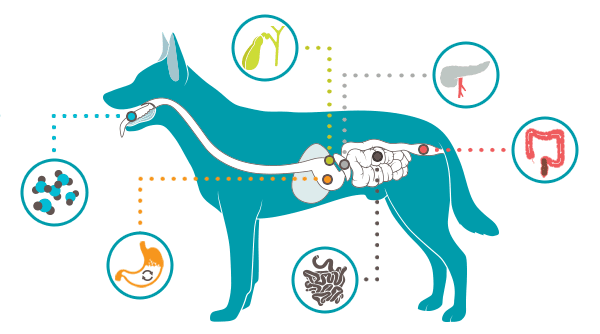Digestive enzymes break down the molecules of food and essentially allow the body to more fully digest proteins, fats and carbohydrates. This helps the dog assimilate the nutrients more efficiently and aids in digestion.
Enzymes come in two forms. Enzymes in the food eaten and the ones found in the digestive organs. The ones found in the digestive organs represent a bank that the body withdraws from. Thus, the need for enzymes from food.
Probiotics are beneficial bacteria in the digestive tract. These bacteria help to keep the unfriendly bacteria in check and restore the normal micro-flora in gastrointestinal tract.
Both digestive enzymes and probiotics enhance your dog’s natural digestion but each of them works differently to support the digestive system. Both digestive enzymes and probiotics are naturally occurring in whole foods.
So, why does your dog need to be supplemented with digestive enzymes and probiotics? There are a variety of conditions which will be helped by the use of these supplements.
1. Your dog suffers from allergies. Digestive enzymes can help break down the proteins that cause the allergic reactions helping the dog to digest those proteins with fewer consequences.
2. Your dog has been on antibiotics. Antibiotics strip the stomach and intestines of all bacteria, unfriendly and friendly. Probiotics restore the good bacteria to a healthy level. Digestive enzymes enhance digestion that is inhibited by the antibiotics.
3. Your dog vomits, has gas or burps. Each of these can be a sign of inhibited or partial digestion. Both digestive enzymes and probiotics can decrease these symptoms by enabling the digestive system to work more efficiently.
4. Your dog has diarrhoea. Probiotics can quickly replenish the good bacteria in the gut which can help firm the stool and reduce their frequency.
5. Your dog has liver disease. The digestive enzyme, Lipase, breaks down and digests fat. This means there is less fat for the liver to deal with and therefore less stress on the liver.
6. Your dog is an active performance dog. Active dogs definitely need to utilise the food they consume to the fullest to support their endurance and muscular strength. Digestive enzymes help make every bite they take count.
7. Your dog has Inflammatory Bowel Disease. Digestive enzymes help break down the proteins, fats and starches to create better digestion and increase the absorption of nutrients which will help alleviate the symptoms of IBD.
8. Your dog is traveling, being boarded or in training. Stress of any kind often creates a reduction in friendly bacteria in the gut, sometimes resulting in diarrhoea or upset tummy. Digestive enzymes reduce the stress from the gut level and probiotics repopulation the healthy flora.
Most dogs, in fact, will benefit from the use of supplemental digestive enzymes and probiotics. They help your dog get the most nutritional value from the food eaten resulting in good health that shows from their energy level to their shiny coats to their healthy joints.
The basic digestive enzymes are:
• Protease – Important in the break down (hydrolysis) of essential nutrients and digestion of proteins (proteolysis)
• Amylase – Helpful in also breaking down essential nutrients and digestion of starch and carbohydrates (glycogen)
• Lipase – Helpful in the breaking down of nutrients and the digestion of fats (lipids)
• Cellulase – Essential for the breaking down of fiber (cellulose)
Digestive enzymes will ensure your dog gets the most nutritional value from their food.
These enzymes are produced by the pancreas, stomach, and salivary glands. Notice the separation between starch and carbohydrates; they are not the same.
The Things Harmful To Digestive Enzymes
Enzymes are fragile organisms. There are many things that can destroy them. This makes it necessary to make sure you control the ones that you can.
The following destroy the enzymes from food (many of these are in processed dog food):
• Herbicides
• Additives
• Flavour enhancers
• Heat
• Food preservatives
• Artificial colourings
The enzymes found in the body perish from:
• Smoke
• Excessive ultraviolet rays
• Medications
• Air pollutants
The Benefits Of Digestive Enzymes For Dogs
Enzymes are essential for each metabolic reaction in the body of a dog. Functioning of the liver, wagging of the tail, and even digestion itself.
Enzymes are life and without them, the body stops functioning. They are chemicals that break down the macronutrients so that the body can use them. These macronutrients are sugars, starches, fats, and proteins.
The benefits of enzymes for canines are many. They include:
• Promote respiratory well-being
• Reduce minor food sensitivities
• Support normal body weight without cravings or hunger
• Promote the safe movement of joints
• Aid in the absorption of minerals and vitamins from food
• Support the immune system
• Maintain appropriate cholesterol levels
• Reduces excessive shedding
• Lessen the occurrences of skin irritation
• Aid in removal of toxins from the body
• Support healthy teeth and gums
• Aid in normal cell growth
• Help reduce heartburn, constipation, bloating, and gas
There are two main types of enzymes in a dog’s system. Categorised according to their functions. These are digestive enzymes and metabolic enzymes. Metabolic enzymes help in carrying out the vital body functions. These functions are the building and the maintenance of cells, tissues and organs. While digestive enzymes work in the stomach and aid in the breaking down of food.
Why Canines Need Digestive Enzymes
Lack of enzymes in a dogs system may cause indigestion. This may result in large `unprocessed` food to enter the bloodstream. This happens from the large intestine. It could be lethal if it happens. In an attempt to survive, the body robs critical metabolic enzymes performing vital functions. Deprived of enzymes, the body suffers from a lack of enough blood cells.
The Anatomy Of The Canine Digestive System And Enzymes
The digestive system of a dog is not the same as that of a human being. It is necessary to know how your dog’s digestive system works. This will help you know the type of food to feed your dog to get the most out of enzymes.
A dogs digestion does not start at the mouth as in humans. At the mouth, its teeth work to tear off meat, bones and fat. The food is then passed through the digestive oesophagus to the stomach.
In the stomach, the food turns into liquid by hydrochloric acid. This goes from the small intestine to the large intestine. This is where the feaces forms and processed.
This takes about 8-9 hours. But what is most interesting is the pancreas. At the small intestine, amylase, protease and lipase mix with food. The pancreas secretes amylase that processes carbohydrates. But amylase cannot produce in the right quantities due to a diet that consists mostly of meat and bone. Thus, their bodies produce more protease to digest the high amounts of protein. This goes to show that most dogs are not well fed and do not receive the required enzyme content they need.
An ideal digestive process should have a rich blend of gastric acid, bile, and digestive enzymes. This would help aid in digestion and absorption of nutrients.
The signs of a not getting these nutrients are countless:
• Bad breath
• Belching
• Gas
• Foul-smelling stool
• Diarrhoea
• Undigested food in dog’s stool
• Abdominal pains
• Gurgling
• Cramping
• Acid reflux
• Vomiting undigested food (4-5 hours after eating)
All these show that your dog is experiencing either indigestion or malabsorption. Most processed pet food is enzyme deficient. The food goes through super high levels of heat and pressure. They also contain added preservatives. All these kill the enzymes in the food given to the dog. Most cheap dog food is made up of nutrient-dead, over-processed ingredients. The food actually does nothing to help in the already enzyme deficient condition.
What To Look For In A Dog’s Digestive Enzyme Supplement
Enzymes found in your dogs body are not always enough. This is because it is constantly used, and like a bank account that is always withdrawn from, it needs refilling.
Eating over-processed food can do more harm than good. The body puts a strain on the pancreas so it can produce enzymes meant for digestion. Metabolic functions such as cell, tissue and organ building and maintenance suffer.
The best solution is to feed your dog with food that is already rich in enzymes. Enzymes work best with vitamins and minerals. Not coincidentally, also found in food that contains large amounts of enzymes.
One of the best sources of enzymes is raw, green tripe. It is rich in enzymes, vitamins, and minerals. The other alternative is feeding your dog whole prey animals. This means including its digestive organs.
Most prey animals eat grass and other green substances that are rich in minerals and vitamins.
Supplemental enzymes do a great deal of work. From tissue and cellular structure to unloading the burden of producing enzymes for the dogs pancreas.
Digestive enzymes can come in 3 forms; animal, plant and fungal. Animal based is preferable since the dog is a carnivore. It will respond well to pancreatic enzymes. It is the perfect mimic of their ancestral diet and it provides pancreatin. Fungal and plant-based enzymes are not recommended. This is due to the chances of your dog being allergic to them.
Enzyme Depletion Theory
All living organisms depend upon enzymes to function properly. Animals contain up to 2,500 different enzymes. These are responsible for catalysing the many chemical reactions taking place in their bodies.
The enzyme deplete theory states as follows:
A change occurs when dogs go from an enzyme rich raw food diet to a high carbohydrate heat processed one. The latter contains grains that are full of starch, cellulose, and carbohydrates.
Because of this, they start producing amylase in their saliva after just one week. The pancreas also sees an increase of amylase production. The pancreas was not designed to produce more amylase.
Furthermore, the pancreas of a carnivore cannot secrete cellulase. Remember, cellulase breaks down cellulose to glucose.
This is not good for them, the reason being is that this change in enzyme production is not a natural occurrence in dogs.
The increase of enzyme production leads to fewer enzymes for other metabolic functions in the body.
Continuous use of these enzymes leads to a depletion of them in the body.
Dogs today do not produce a lot of amylase because of their primary diet – meat. Their ancestors used to hunt their prey. They would eat the animal’s digestive tract which contained enzymes. As you know, today’s domesticated dogs no longer hunt for food.
The enzyme depletion theory is also known to speed up ageing since there are fewer enzymes. Keep in mind, enzymes build and repair cells, tissue, and organs.
Many unwanted consequences follow due to the decline of enzyme production.
It is also worth mentioning that strenuous exercise, serious illness, old age and extreme weather contribute to more enzyme use.
All this is why it is important to make sure your dog has an adequate amount of enzymes.

